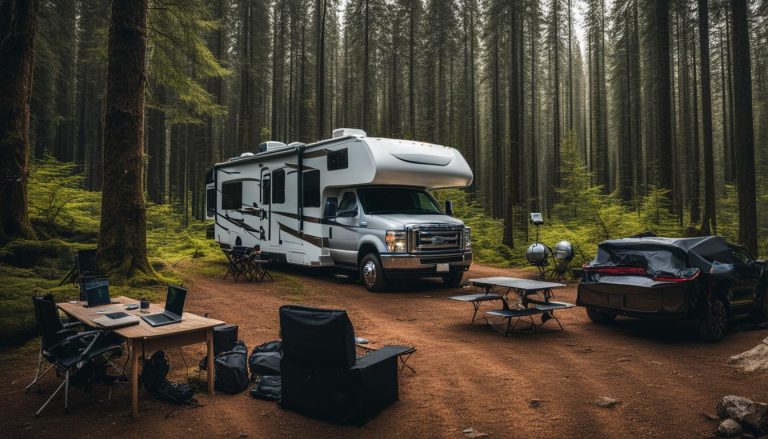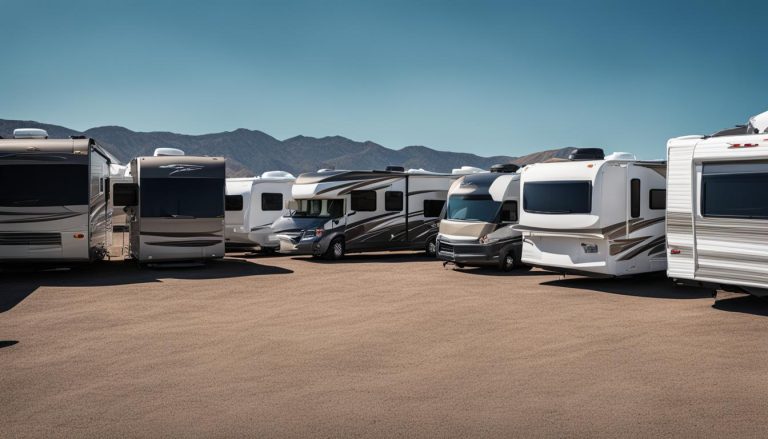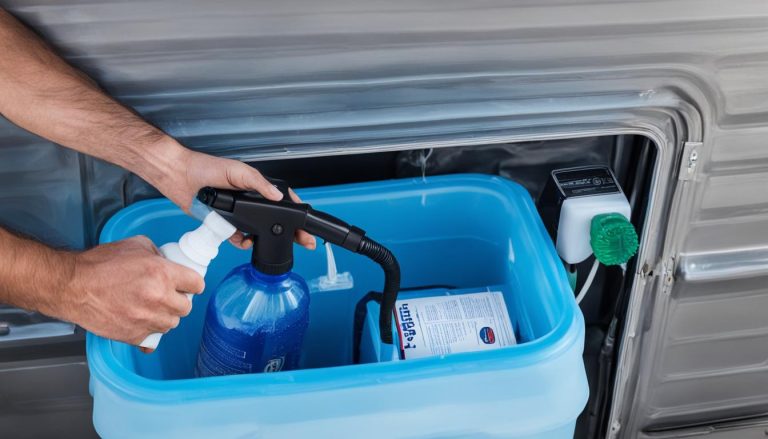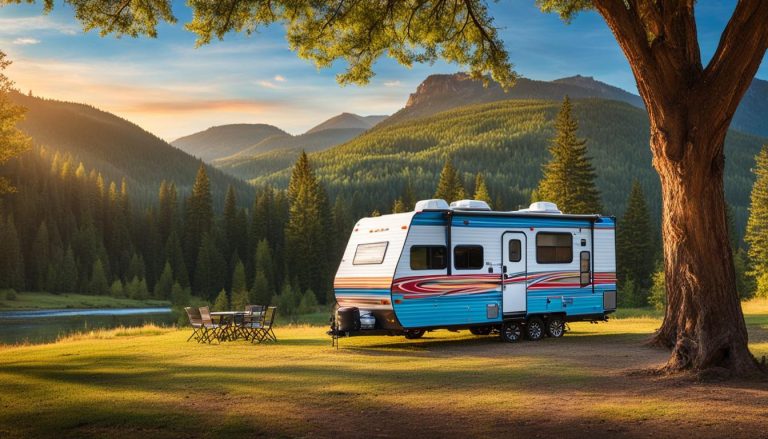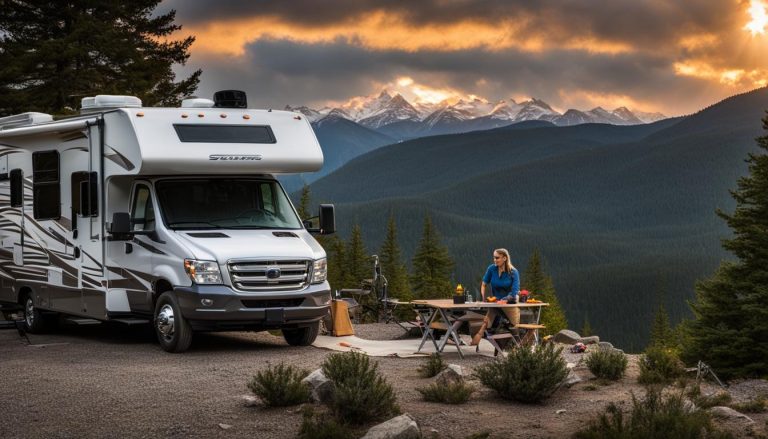Eco-Friendly Tips: How to Dispose of an RV
gorvlifestyle.com and its partners may earn a commission if you purchase a product through one of our links
If you’re an RVer looking for eco-friendly ways to dispose of your RV, you’re in the right place. While not everyone can afford to buy a new rig or transition to biofuel, there are still steps you can take to ensure responsible RV disposal. By implementing proper techniques, you can minimize your environmental impact and contribute to a greener planet.
When it’s time to say goodbye to your trusty companion, consider the following options: recycling, selling, or donating. Each method has its own benefits and can help you find a new purpose for your old RV.
Key Takeaways:
- Recycling, selling, or donating are eco-friendly options for disposing of an old RV.
- Proper disposal techniques minimize environmental impact and promote sustainability.
- Research local RV wrecking yards for recycling possibilities in your area.
- Selling your RV gives it a new home and allows someone else to enjoy it.
- Donating your RV to a worthy cause helps support charitable organizations and benefits those in need.
Use Your RV Awning and Consider Solar Power
When it comes to staying cool in your RV during those hot summer months, instead of relying heavily on air conditioning, why not take advantage of your RV awning? Using your awning not only reduces energy consumption but also allows you to enjoy the outdoor scenery while staying comfortably shaded.
By deploying your RV awning, you can create a cool and relaxing outdoor space right next to your RV. Whether you’re enjoying a meal, reading a book, or simply unwinding with your favorite beverage, the shade provided by your awning offers a refreshing retreat from the heat.
Instead of constantly running your AC, using your RV awning can help you save energy and stay cool naturally. Plus, it’s a great way to fully embrace the RV lifestyle and connect with the beauty of the great outdoors.
Cooling Off with RV Awnings: Benefits and Tips
To make the most of your RV awning, here are some key benefits and tips to keep in mind:
- Energy Independence: By utilizing your RV awning for shade, you can reduce your reliance on air conditioning and other energy-consuming appliances, allowing for greater energy independence and decreased utility costs.
- Enhanced Outdoor Living: Your RV awning provides an extension of your living space, enabling you to spend more time outdoors. You can set up comfortable seating, host BBQs, and create a cozy atmosphere for socializing with fellow campers.
- Protection from the Elements: In addition to providing shade from the sun, your RV awning also offers protection from light rain showers, allowing you to stay outside and enjoy the fresh air without getting wet.
- Easy Setup and Maintenance: Most RV awnings are designed for ease of use, making setup and maintenance a breeze. With proper care, your awning can provide years of reliable outdoor comfort.
Consider Solar Power for Energy Independence
Another way to achieve energy independence in your RV is by considering solar power. Investing in solar panels for your rig can provide numerous benefits, both for the environment and your wallet.
Solar power is a clean and renewable energy source that allows RVers to harness the power of the sun and reduce their carbon footprint while enjoying all the comforts of home on the road.
By utilizing solar energy in your RV, you can:
- Reduce Reliance on Traditional Energy Sources: Solar power provides a sustainable alternative to traditional energy sources, reducing your dependence on fossil fuels and decreasing your environmental impact.
- Enjoy Energy Independence: With solar panels installed on your RV, you can generate your own electricity, enabling you to camp off-grid for longer periods without the need for hookups or noisy generators.
- Save on Energy Costs: By harnessing the power of the sun, you can significantly reduce or even eliminate your need for shore power or campground fees, resulting in substantial cost savings over time.
With advancements in solar technology, solar panels have become more affordable and efficient, making them a viable option for RVers who want to embrace a more sustainable and cost-effective lifestyle.
So, the next time you hit the road in your RV, remember to make the most of your awning for staying cool and enjoying the outdoors. And consider harnessing the power of the sun with solar panels for a greener and more energy-efficient journey. With these eco-friendly tips, you can have a memorable and environmentally conscious RV adventure.
Recycle On the Road and Use Reusable Dishes and Utensils
As an eco-conscious RVer, it’s important to find ways to reduce waste and minimize your environmental impact while on the road. Recycling can be a bit challenging, but with a little effort, you can do your part to protect the planet. When it comes to recycling on the road, here are some tips to help you stay environmentally friendly:
- Designated Bins: Keep separate bins in your RV for recyclable items like plastic bottles, aluminum cans, and paper products. This way, you can easily collect them and ensure they don’t end up in the landfill.
- Research Recycling Centers: Before you hit the road, do some quick online research to find recycling centers along your route or at your destination. Many cities and towns have conveniently located recycling centers where you can drop off your recyclables.
- Grocery Store Options: Another way to recycle on the road is by taking advantage of recycling options at grocery stores. Many stores now provide bins for plastic bag recycling, and some even accept other types of recyclables.
- Recycling Apps: Downloading a recycling app can be a handy tool to help you locate recycling centers, drop-off locations, and other recycling options while you’re on the go.
In addition to recycling, another great way to reduce waste in your RV is by using reusable dishes and utensils. Disposable plates, cups, and cutlery may be convenient, but they contribute to a significant amount of waste. By switching to reusable options, you can significantly minimize your waste production while still enjoying your meals on the road.
Investing in durable, reusable dishes, cups, and utensils made from materials like stainless steel, bamboo, or silicone ensures you have a sustainable and eco-friendly alternative to single-use items. Simply wash the dishes after each use, and you’re ready to go. Plus, using reusable dishes and utensils not only helps the environment but also adds a touch of elegance to your dining experience in your RV.
For easy clean-up, consider using eco-friendly dishwashing practices in your RV. Use biodegradable dish soap and hot water to wash your dishes. If you’re boondocking and water is limited, you can also use dishwashing wipes or spray cleaners specifically designed for eco-friendly dishwashing on the go.
Quote:
“Recycling and using reusable dishes and utensils are simple yet effective ways to minimize waste production and be more eco-friendly while traveling in your RV. These small changes can make a big difference in protecting the environment for future generations.”
By prioritizing recycling and using reusable dishes and utensils, you can make a positive impact on the environment and contribute to a more sustainable RV lifestyle. Take the initiative to recycle on the road and embrace eco-friendly dishwashing practices to minimize waste production and create a greener RVing experience.
Recycling Centers Along Popular RV Routes
| State | City | Recycling Center |
|---|---|---|
| California | Los Angeles | Green Earth Recycling Center |
| Texas | Austin | Keep Austin Recycling |
| Oregon | Portland | Recycle Oregon Center |
| Florida | Miami | Sunshine Recycling Facility |
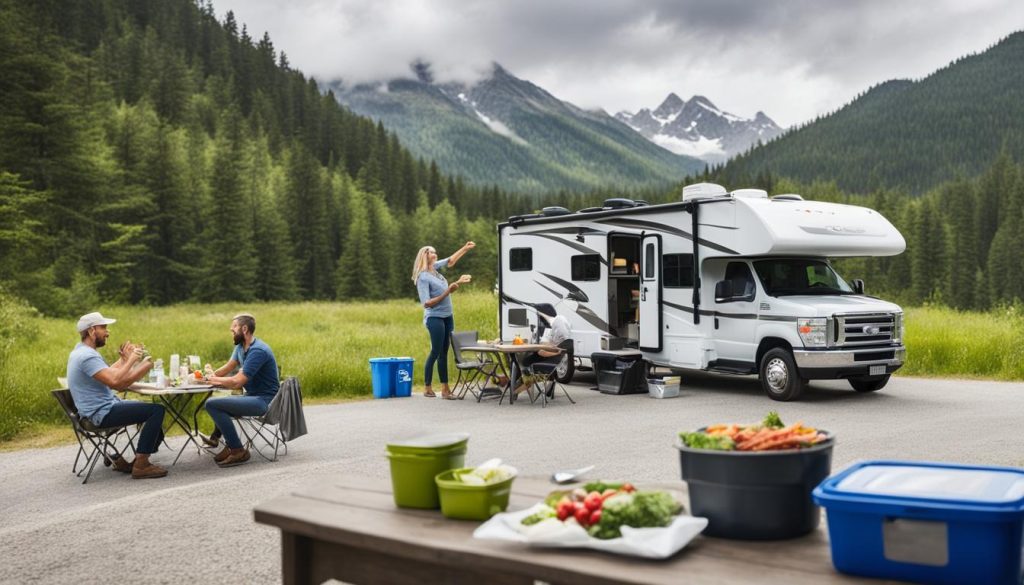
Be Responsible With Your Fire and Visit Eco-Friendly Campgrounds
When it comes to camping, campfires have always been a beloved tradition. The crackling flames, the warmth they provide, and the cozy ambiance all contribute to the camping experience. However, it’s important to be mindful of the environmental impact of campfires. By following a few simple guidelines, you can minimize smoke and pollutants from your campfires, making your outdoor adventures more eco-friendly.
Minimizing Smoke and Pollutants
One of the key aspects of responsible campfire usage is to avoid burning trash. Burning plastics, foam, or other materials can release harmful toxins into the air, posing a threat to both humans and wildlife. Stick with burning dry firewood or natural fire-starting materials. This not only reduces smoke and pollutants but also prevents the spread of potentially dangerous chemicals.
Remember, keeping your fires small and manageable can help prevent accidental wildfires and protect the surrounding environment.
Choosing LED Lights for Outdoor Lighting
When it comes to lighting up your camping area, opt for eco-friendly alternatives such as LED lights. LED lights are energy-efficient, consuming less power than traditional incandescent bulbs. This means longer battery life and reduced energy consumption during your camping trips. Plus, LED lights produce a bright, clean light that is perfect for illuminating your outdoor space without causing light pollution.
By using LED lights for outdoor lighting, you can enjoy your evenings in a sustainable and eco-friendly way, minimizing your impact on the environment.
Visiting Eco-Friendly Campgrounds
Another way to embrace sustainable camping is by choosing to stay in eco-friendly campgrounds and green-friendly RV parks. These campgrounds prioritize sustainable practices, such as reducing water and energy usage, implementing recycling programs, and promoting environmental awareness among campers.
When planning your camping trips, look for campgrounds that have earned eco-certifications or have a reputation for sustainability. By supporting these eco-friendly establishments, you contribute to their efforts in preserving and protecting nature while enjoying your outdoor adventures.
| Campground | Location | Sustainable Practices |
|---|---|---|
| Green Valley Campground | Oregon | Use of solar power, recycling program |
| Nature’s Haven RV Park | California | Water conservation initiatives, native plant landscaping |
| Eco Oasis Campground | Colorado | Composting facilities, energy-efficient amenities |
Choosing eco-friendly campgrounds ensures that your camping experience aligns with your values of sustainability and conservation. It’s an opportunity to connect with nature while minimizing your environmental footprint.
Use Eco-Friendly Food Containers and Recycle on the Road
In your quest to live a more eco-friendly lifestyle while traveling in your RV, one area where you can make a big impact is in your food storage and waste management practices. By opting for eco-friendly food containers and actively seeking out recycling options, you can significantly reduce plastic waste and contribute to a cleaner, greener environment.
Eco-Friendly Food Storage Options
Instead of relying on single-use plastic wrap and bags, consider switching to reusable alternatives that are not only better for the planet but also more economical in the long run. Look for eco-friendly food containers such as silicone reusable bags or washable storage containers. These options are durable, easy to clean, and can be used over and over again, eliminating the need for disposable plastics.
By investing in eco-friendly food storage options, you’ll be able to keep your leftovers fresh, store fruits and vegetables without plastic bags, and pack snacks for your road trips—all while reducing your environmental footprint.
Reducing Plastic Waste While Shopping
Another area where you can make a difference is by minimizing your use of plastic bags while shopping for groceries. Instead of reaching for disposable plastic produce bags, bring your own reusable produce bags for fruits and vegetables. These lightweight, washable bags are perfect for carrying your fresh produce and can be used repeatedly.
Additionally, bring along reusable grocery bags for your shopping trips. These sturdy bags are not only eco-friendly but also more durable than their plastic counterparts. By saying no to single-use plastic bags, you’ll be reducing plastic waste and helping to protect our oceans and wildlife.
Finding Recycling Options While Traveling
As an eco-conscious RVer, it’s important to continue your recycling efforts even when you’re on the road. While it can be challenging to find recycling centers or grocery stores with recycling options in unfamiliar locations, there are resources available to help you in your quest to recycle responsibly.
Recycling apps can be a valuable tool for finding nearby recycling centers, drop-off locations, or grocery stores that offer recycling bins. These apps provide up-to-date information and can help you locate recycling options wherever you are.
Additionally, consider planning your route to pass through towns or cities that are known to have recycling facilities. By being proactive and consciously seeking out recycling options, you can ensure that your recyclable waste doesn’t end up in landfills, reducing your environmental impact while on the road.
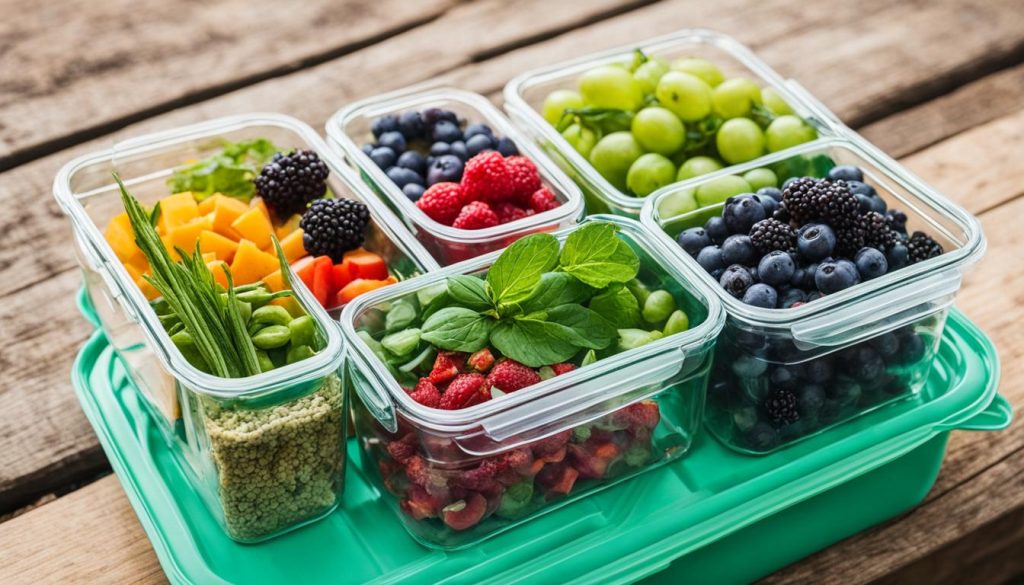
“The earth does not belong to us; we belong to the earth.” – Chief Seattle
Summary
By using eco-friendly food containers, minimizing plastic waste while shopping, and actively seeking out recycling options while traveling, you can play a vital role in reducing your environmental impact as an RVer. Small changes in your food storage and waste management practices can add up to significant positive contributions to our planet’s health.
Improve Your Fuel Economy and Use Eco-Friendly Transportation
When it comes to maximizing fuel efficiency in your RV, there are several measures you can take to reduce your carbon footprint and save money on fuel expenses. By prioritizing tire maintenance, optimizing travel planning, and exploring alternative transportation methods, you can contribute to a more eco-friendly RVing experience.
Maintain Your Tires for Fuel Efficiency
Proper tire maintenance is crucial for improving fuel economy. Ensure that your RV tires are inflated to the manufacturer’s recommended pressure levels. Underinflated or overinflated tires can negatively impact fuel efficiency. Additionally, consider investing in low rolling resistance tires that are specifically designed to reduce friction and enhance fuel economy. Regularly inspecting tire tread depth and replacing worn-out tires also contributes to optimal fuel efficiency.
Plan Your Travels for Fuel Savings
Effective travel planning can significantly impact your fuel consumption. When mapping out your routes, consider factors such as road conditions, traffic congestion, and elevation changes that may affect fuel efficiency. Opt for routes with smooth pavement and minimal traffic to maximize fuel savings. Additionally, planning your trips to minimize mileage and reduce unnecessary detours can help conserve fuel. Take advantage of navigation systems and smartphone apps that provide real-time traffic updates and alternative route suggestions to optimize your travel plans.
Explore Alternative Transportation Methods
Using alternative transportation methods while traveling can further reduce your carbon footprint. Consider utilizing bicycles or scooters for short-distance trips in your destination area. They not only promote a healthier and more active lifestyle but also eliminate the need for using your RV for every small errand. Many campgrounds and RV parks now offer bicycle rentals to cater to eco-conscious travelers. Additionally, public transportation options, such as buses or trains, can be a convenient and eco-friendly alternative to driving your RV within city limits. Research local public transport options in your destination and embrace sustainable travel practices.
By implementing these strategies, you can improve your RV’s fuel economy while minimizing your environmental impact. Prioritize tire maintenance for optimal fuel efficiency, plan your travels strategically to minimize mileage and fuel consumption, and explore alternative transportation methods whenever possible. Taking these steps not only benefits the environment but also enhances your RVing experience by reducing costs and providing opportunities for exploration. Embrace eco-friendly practices and pave the way for a greener RV lifestyle.
Consider Solar Power and Reduce Waste
When it comes to living an eco-friendly lifestyle in your RV, there are several steps you can take to reduce your carbon footprint and minimize waste. One of the most impactful ways is by adding solar panels to your RV. Not only does this provide sustainable energy, but it also extends your boondocking capabilities, allowing you to enjoy off-grid adventures without relying on traditional power sources.
In addition to solar power, another important aspect is insulating your RV for temperature control. Proper insulation helps regulate the interior temperature, reducing the need for constant heating or air conditioning. This not only saves energy but also improves your overall comfort while on the road.
When it comes to cleaning, opting for eco-friendly products is a simple yet effective way to promote a greener lifestyle. Look for biodegradable and non-toxic cleaning solutions that are gentle on the environment and safe for you and your RV. By making this small switch, you can contribute to a healthier planet and minimize your ecological impact.
Lastly, reducing waste in your RV is crucial for a sustainable lifestyle. Consider implementing composting practices to manage food scraps and organic waste. Composting not only helps divert waste from landfills but also produces nutrient-rich soil for your future outdoor adventures. Additionally, be mindful of your consumption habits and make an effort to recycle and minimize single-use items whenever possible.
FAQ
How can I dispose of an RV in an environmentally friendly way?
There are several options for environmentally friendly RV disposal. You can consider recycling your RV, selling it to someone who can make use of it, or donating it to a charitable organization. Properly disposing of old RVs through wrecking yards is also an option.
What are some tips for using my RV awning and incorporating solar power?
Instead of relying on air conditioning, you can use your RV awning to stay cool during warmer seasons. This helps reduce energy consumption and allows you to enjoy the outdoor scenery. Another eco-friendly option is to invest in solar power, which can greatly reduce reliance on traditional energy sources and provide energy independence.
How can I recycle while traveling in an RV?
Recycling can be challenging while traveling in an RV, but it is still possible. You can store recyclable items in designated bins and look for nearby recycling centers or grocery stores with recycling options. Additionally, using reusable dishes and utensils instead of disposable ones can greatly minimize waste production and be more environmentally friendly.
What can I do to be more responsible with my campfires and choose eco-friendly campgrounds?
To be more responsible with campfires, avoid burning trash, keep fires small, and use LED lights for outdoor lighting. You can also choose to stay in eco-friendly campgrounds that prioritize sustainable practices, reducing your environmental impact.
How can I minimize plastic waste while on the road?
Using eco-friendly food containers such as silicone reusable bags or washable storage containers can greatly reduce the use of single-use plastic wrap and bags. Additionally, using reusable produce bags while shopping and bringing reusable grocery bags can help minimize plastic waste. You can also actively seek out recycling options while on the road, such as recycling centers, grocery stores with recycling bins, or utilizing recycling apps to find drop-off locations.
How can I improve my RV’s fuel economy and use eco-friendly transportation?
To improve fuel economy, ensure proper maintenance of tires, reduce weight in the RV, and plan travel routes that minimize fuel consumption. Additionally, using alternative forms of transportation like bikes, scooters, or public transport can reduce reliance on cars and further reduce fuel consumption.
How can I make my RV more sustainable overall?
Installing solar panels on an RV can provide sustainable energy and extend boondocking capabilities. Insulating your RV can help reduce the need for heating or air conditioning and minimize energy consumption. Using eco-friendly cleaning products and reducing waste through composting can also contribute to a more sustainable RV lifestyle.

